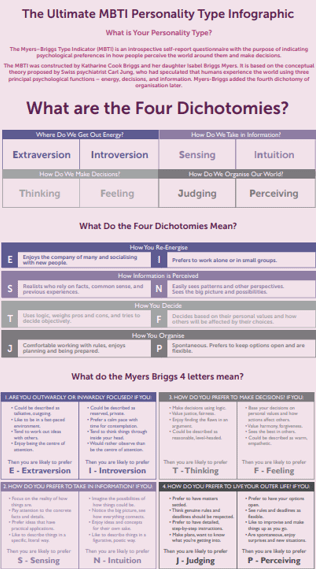‘The Artist’
Sometimes it’s not the strength but gentleness that cracks the hardest shells.” -Richard Paul Evans
Here, in this complete guide, melodies will try to inspire you to sing along with ISFPs. As Einstein said:
The best way to learn is by playing.”
Fundamentally, ISFPs are a special breed, a very special breed indeed. So, let’s get to know everything about ISFPs and their personality type to build a memorable relationship dynamic with them. And, of course, if you’re an ISFP, you’re in for a treat.

MBTI | An Overview
To begin, MBTI is based on Carl Jung’s work, “the influential theory of psychological types” dating back to 1921. His work talks about preferred types of behaviour with four main functions. So, the first two functions define the way we perform – how we take information and how we make decisions. Then, the second two functions define our energy or form of expression – extraversion and introversion.
Development of MBTI
Then, strong with the belief that Jung’s theory on the knowledge of preferences will help women find work, Isabelle Myers, with the help and guidance of her mother Katherine Briggs, embarked on a journey that led to the birth of MBTI, also known as Myers Briggs Type Indicator.
Actually, one of the key advancements the mother and daughter added to the MBTI dimension is the attitude to the outer world and so the birth of a 4th preference came to light.
The 4 Dimensions of MBTI
First Dimension – First, how do you express your energy: are you an Extrovert (E) or an Introvert (I)?
Second Dimension – Next, how do you process information: are you a Sensor (S) or an Intuitive (N)?
Third Dimension – Then, how do you make decisions: are you a Thinker (T) or a Feeler (F)
Fourth Dimension – Finally, how do you like your lifestyle: are you a Judger (J) or a Perceiver (P)

The different combination of those 4 dimensions results in 16 profiles which we know as MBTI. Subsequently, those 16 profiles are divided into 4 different quadrants or families which we call:
- First, the Rationales (INTJ, INTP, ENTJ, ENTP)
- Second, the Idealists (INFJ, INFP, ENFJ, ENFP)
- Next, the Guardians (ISTJ, ISFJ, ESTJ, ESFJ)
- Finally, the Artisans (ISFP, ISTP, ESFP, ESTP).
To explain, while we are born with a certain set of tendencies, we also develop subsequent tendencies as we grow up due to our environment and the experiences we go through.
And, just in case your curiosity is getting the better of you, you can check our ultimate MBTI guide (Myers Briggs). And if you want to confirm you are ISFP, you can go through this short MBTI test.
Sticky Learning ® is 7 times more effective than 1-day training courses. Plus, you will get a Chain of Evidence proving your Return on Investment. Discover soft skills training that changes behaviours long term.

ISFP| Meaning
The acronym ISFP stands for:
I – Introversion
S – Sensing
F – Feeling
P – Perceiving
Foundationally, ISFPs are the artists and doers of the different personality types. Commonly, they have a gentle and sensitive introverted side mixed with their realistic and factual sensory side. ISFPs are also attracted to others and cooperate well with them (their feeling side), adding to it their adaptability and spontaneous nature (as perceivers). What a combination!
Now, saying that ISFPs are primarily musical artists can sometimes do them a disservice. In fact, they are at the forefront of the healthcare industry, and they rock it like champions. They just have a different kind of artistry; they care about our health
So, are you a Pisces? Or, perhaps you enjoy being a freelance creative director, image consultant, or even a graphic designer as a side hustle? Then, you are most probably an ISFP. Well, if you’re still on the fence and would like to be certain, here’s an additional list you might want to check.
Since ISFP women make up about 10% of the population, here is an interesting question to ponder upon:
How Can You Tell if a Woman is an ISFP?

Realistically, female IFSPs have many favourable qualities that make them stand out. They include:
- Quiet, possibly shy
- Supportive and adaptive
- Quite carefree
- See the best in others
- Can be prolific moderators
- Excels in the social service industry
- Can be a great artist.
Now, it’s important to note that this list is not the complete guide but a taste of some of the great qualities female ISFPs have.
What is an ISFP Person Like?
So, as an ISFP, you can be a musical genius or a miracle healer. Among your most important qualities are:
- Caring
- Trusting
- Cooperative
- Loyal
- Kind
- Understanding nature
- Realistic
- Practical
- Adaptable
Granted, you enjoy having a good time in nature and let your creativity blossom. However, you do have an adventurous side too. Additionally, you inspire people with your music, or you heal people with your profound care and healing tools. On the downside, you can get mixed up in unpleasant situations which you can’t get yourself out of. Also, you can be stuck in your own ways.
ISFP | Personality Type and Rarity
So, what elements make up this personality type? And, just how rare are they?
Personality Features
Primarily, this group has a number of outstanding features that set the apart. In fact, due to the combination of their 4 traits, they can make a lasting impression on others.
- First, they are quiet and unassuming. Usually, they avoid the limelight and let others shine.
- Second, they are nonjudgmental. As such, this allows others to feel comfortable to voice their opinions in their presence without fear of criticism.
- Next, they are active listeners. They are willing to give a listening ear to friends and close connections.
- Also, they pride themselves on helping others. Although they are not ambitious for themselves, they want to help others achieve success and get results.
- Finally, they enjoy adventurous experiences and trying new things.
Now, if you are an ISFP, or know of one, you will probably recognise these features quite easily. For instance, do you have a colleague on your team who is always willing to step in and help, not looking for reward or recognition? Or, maybe you have a friend or family member who likes to try new fun activities that activate their adventurous side? Even more, you yourself might be the shy, unassuming type that resonates with some of these features.
How Rare are ISFPs?
So, is this personality type one of the rare ones? Well, as the 6th most common personality type (6.6% of the population) and one of four artisans, ISFPs are truly an inspiration. They are all about art and beauty and the present moment. Meaning, they are fairly rare in comparison to other types.
In terms of gender distribution, male ISFPs are less common than females. In fact, they only make up about 40% of all ISFPs. Other statistics for this type are:
- 5.5% of men
- 7.5% of women
So, as you can see, the numbers speak for themselves in terms of rarity.
ISFP | Strengths
Ideally, we all like to highlight our strengths and show the best parts of ourselves. Here, we will see some of the common strengths associated with ISFPs.
#1: Empathic
So, the ISFPs have a real awareness of the feelings of others. As such, they show empathy effectively. This makes them quite caring towards those they work with and are in relationships with.
#2: Adaptable
Naturally, this type can adapt to change with ease. As a result, they will be ready for the adventure of the unknown and take on the challenge willingly.
#3: Imaginative
Here, we readily see their creative side shine in any career or activity they pursue. So, it’s no wonder this personality type has the nickname of “The Artist”.
#4: Independent
Next, we see them ready to complete tasks even as a solo mission. Therefore, they can work unsupervised with ease as well as take on leisure pursuits without the need for companionship. That’s not to say that they will only do things on their own. Instead, it means that they can be alone without being lonely.
#5: Observant
Finally, they are an observant bunch. They really have a great eye for detail and notice even the small things.
ISFP | Weaknesses
Every type has their weaknesses. Now, let’s see some to be aware of for the ISFPs.
#1: Overly Sensitive
Now, due to their high levels of empathy and the fact that they really want to keep the peace, we see many ISFPs with a heightened sensitivity side. Meaning, they hurt easily and can be slow to heal from those wounds.
#2: Lack Long-Term Vision
Unfortunately, because IFSPs focus on the present, they often forget to give time and attention to the future. On one hand, it’s a good thing to be present in the present and not let the here and now pass you by. However, we all need big picture views to set goals and objectives for long-term results.
#3: Seen as Indecisive
Here, we see their flexible, easy-going nature sometimes work against. That is to say, because they very often want to keep the peace or not choose sides, they can be seen by others as lacking effective decision-making skills. Also, they may change their mind if they think that it will please others. However, this simply adds fuel to the flames of their indecisive image.
Dark Side of the IFSP Personality
Now, in addition to the weaknesses we mentioned above, here, let’s see some of the darker sides of this personality trait.
- First, they can come across as cold to some other personality types.
- Next, they feel out of control under stress, which in turn can lead to burnout.
- Then, they can become fearful of situations that overwhelm them. In turn, this leads them to negative thoughts and pessimism.
- Also, their unhealthy need to beat others in tasks, therefore this overly competitive side can lead to them being openly rude of others.
However, these “dark side” attributes can be controlled once ISFPs are aware of their existence and how they can develop.
ISFP | Compatibility and Relationships
So, who should ISFP marry? Actually, Artisans are most compatible with Guardians. As an Artisan, ISFP have the best flings and passionate short-term relationships with ESTJs. On the other hand, they have the best long-term lovey-dovey relationship with ISTJ.
Primarily, it’s important to have a balance of two traits in common and two complementary. In that way, the two in common will help you feel at home with the person. Alternatively, the two complementary will give you the friction to keep the sparks alive. Choosing the right combination to find your ‘almost’ ideal match will depend on your upbringing, your current environment (and if you want to change it), and the goals you want to achieve in life.
Now, taking the example above, the ESTJ will bring extraversion, a more objective way of looking at things, and a more routine life for you and into your relationship. While this combination is intriguing in the short term it can exhaust you in the long haul.
ISFP and INFP
So, how similar do you think ISFP and INFP are? Well, let’s take a moment to reflect before delving deeper.
Now, while ISFP and INFP have a similar approach towards people and they share a strong core (IFP), one letter separates them. Naturally, this letter makes all the difference. This one letter makes them think and process information differently. As a result, they see the world differently.
On the one hand, ISFP is more factual, practical, and present-oriented, whereas INFP is more idealistic and future-oriented. This can be a good combination and has a lot of potential for growth and happiness.
ISFP and INFJ
Firstly, unless you are prepared to give space for each other in your day-to-day routines and activities, this is not an ideal relationship. Actually, the only instance where this could works is if you are close to the 50% variance regarding your P and T functions. Meaning, the more extreme you both are, the less likely your relationship will work.
However, ISFP can be loving and loyal friends and compassionate colleagues.

Remember, ISFP and INFJ share the introverted and feeling functions which give them some leverage. Meaning, they both share their love for some alone time and some quality time within a small group.
ISFP | How E & I Can Help Complement Each Other
Here, Extroverts can help introverts open their sphere of influence by:
- Moving into action
- Broadening their ideas
- Amplifying their energy focus
- Expanding their interaction
- Widening their network
- Providing extensive information
Alternatively, Introverts can help extroverts centre themselves by:
- Reflecting more
- Scanning through ideas
- Deepen their calmness
- Strengthen their concentration
- Deepen their friendships
- Listening to others
ISFP | How S & N can help complement each other
Now, Sensors can help intuitivist be more practical by:
- Adding more facts
- Providing more practical and realistic information
- Looking deeper at the details
- Applying their experience when solving problems
- Focusing on what needs attention now
- Focusing on the present
Also, Intuitive can help Sensors recognise the inter-connectedness by:
- Looking at new ideas
- Creating change
- Being open to looking at trends
- Applying insight and pattern recognition to solving problems
- Focusing on long-term goals instead of short-term goals
- Focusing on future possibilities
ISFP | How T & F can help complement each other

Then, Thinkers can help Feelers get clearer and more direct by:
- Analysing the implications and consequences
- Being consistent with rules
- Standing firm on important principles
- Being more objective when making decisions
- Having specific criteria that allow a clearer thinking process
Additionally, Feelers can help Thinkers reconnect by:
- Predicting how others will react and feel
- Making individual exceptions when necessary
- Accepting human-centred values
- Allowing better cooperation and collaboration
- Creating a more harmonious environment
ISFP | How J & P can help complement each other
Ideally, Judgers can help Perceivers be more productive by:
- Being more organised and decisive
- Sharing decisions and moving ahead
- Being in control
- Having closure
- Focusing on tasks and goals
- Providing clear expectations and timelines
Similarly, Feelers can help Judgers be open to possibilities by:
- Being more flexible and adapting better
- Dealing with situations as they arise
- Embracing new experiences
- Being open to options
- Being open to new information
- Accepting change
Now, as an ISFP, your opposite would be ENTJ. So, I’d like to invite you to choose one point of each of your opposite (that makes 4 points) and develop them, make them part of you.
ISFP | How to Communicate with your ISFP Manager, Colleague, or Romantic Partner
Surely, you want to get the most out of your ISFP colleague/employee/boss or even your romantic partner. Well, it’s simple actually, just act as they would, and they will love you for it. So much that you will see their productivity skyrocket, their affection for you increases, and more.

The 6 ISFP Rules for the Extrovert (rule 0: no open space)
First, you need to understand how to better relate to your opposite – the introvert.
- Practice active listening.
- Think before you speak. And, if you must speak, let them know you are thinking out loud.
- Choose a time and place to communicate with a minimum distraction.
- Pause and wait for a response, don’t jump in to fill the silence, especially with small talk.
- Don’t come across as imposing or demanding of an immediate response.
- Avoid making immediate decisions.
The 6 ISFP Rules for the Intuit (rule 0: dream a little, you are allowed)
Next, keep the following best practices in mind when interacting with an ISFP.
- Provide step-by-step, detailed information on specific tasks (share the facts before giving the big picture).
- Provide as many concrete facts and examples to prove your ideas (and I mean to be super generous).
- Share more facts and observations (tables, graphs, infographics, they are all welcome).
- Be organised in your presentation, and present your thoughts and findings in a sequential manner (don’t just share links and ideas).
- Remember that others might not seek change – be open to sticking to a plan.
- Assess what is working well as well as what needs to be changed.
The ISFP Rules for the Thinker (rule 0: people buy emotions, not facts)
Then, make sure you apply the following actions.
- Take the time to get to know ISFPs and develop a rapport with them.
- When you are listening, avoid criticism.
- Remember to be friendly and offer support and encouragement.
- While honest feedback is important, remember to provide it gently and to critique the behaviour instead of the person – acknowledge don’t analyse feelings and values.
- While focusing on your tasks and objectives, remember that individuals are also involved in the situation – adding a personal touch would go a long way.
- Focus on creating a win-win situation, not everyone likes competition.
The 5 ISFP Rules for the Judger (rule 0: “There is no shred of evidence that life is meant to be serious.” Unknown author)
Now, make sure you, the Judger, use the following rules to cooperate best with ISFPs.
- Before making decisions, explore alternative opportunities.
- To make sure the project goes to completion, discuss, and establish a timeline together with the ISFP instead of just giving them a deadline – that way it looks as if the deadline is intrinsic rather than forced upon them.
- Avoid making quick decisions and rather seek additional information before making a decision.
- Try to be open to change – whether the situation, the dynamic or even the plan.
- Set your perfectionism aside and be willing to take a few steps even if your master plan is not ideal yet.
ISFP | What Stresses ISFP

Ideally, we all need to know our stress triggers. Then, we need to know how to take action before we allow the stress to engulf us. Finally, we need to be aware of the triggers of other people too. So, let’s see some of those potential ISFP triggers.
First, the 5 stressors linked to their introversion:
- Working with others.
- Talking on the phone a lot.
- Interacting with others often.
- Having to act quickly without reflection.
- Too many concurrent tasks and demands.
Then, the 4 stressors linked to their feeling:
- Setting criteria and standards.
- Criticism and concentration on flaws.
- Focusing on tasks only.
- Asking questions that seem inappropriate.
So, are you up for a challenge? Yes? In that case, I would like to invite you to work on one of the points mentioned above so that you are in control of your stressor rather than it controlling you. And remember, “Rome was not built in a day.” So, take it one bite at a time. Then, when ready, do one additional small step.
ISFP | Careers
In reality, there are some amazing career choices for the ISFPs. After all, they have a great mix of qualities and characteristics. With that in mind, here are some that might interest this personality type.
- Fashion Designer
- Interior Designer
- Massage Therapist
- Nurse
- Florist
- Animal Trainer
- Special Education Teacher
- Firefighter
- ER Physician
Remember, in addition to their creative side, they are great care givers due to their empathy. So, find those roles that allow for your creative or caring side to shine through.
It’s All About the Environment
There are more career paths of course (you can check XYZ personality type’s list in this short video). However, what’s most important to keep in mind for ISFPs (and for those wanting to hire or work with ISFPs) is that having a good workplace environment is key for ISFP’s success.
As an SF core, your main strength is seeing the warmth and realistic approach you have with people. Additionally, you solve problems and make decisions using your SF functions.
Now, with S you tune in to facts, common sense, and previous experiences. As a result, you see things as black or white, and true or false. In fact, there is no alternative or second guessing. Instead, it’s all about practical applications. Then, with F you see where the decision fits with people and the values of the organisation and assess the effect on both. Finally, you determine how to win others over to your solution.
According to Personality Junkie, a kinesthetic job would be advantageous for ISFP as they are intuitively in tune with their bodies, hence, their excellence in fields such as music, dancing, painting, and designing. Adding to it the variety in the job would be the exact environment ISFP would thrive in.
ISFP | Lifestyle and Interests

Naturally, ISFPs enjoy… you guessed it, kinesthetic and creative activities geared towards beauty and art and if possible, by themselves. Nature calls for them (they are the tree huggers). So, most likely, we would see them enjoying some of the following hobbies and pursuits.
- Gardening
- Poetry
- Pottery
- Nature walks
- Individual sports activities, such as, skiing, swimming, etc.
- Hosting small, intimate gatherings for close friends/family
- Painting
Basically, give them any pastime linked to the arts or a physical activity that is not a team sport, and they will usually embrace the event.
Quotes
Consider this, quotes that resonate can inspire. So, let’s dig in and see what inspires ISFPs:
“Love begins at home, and it is not how much we do, but how much love we put in the action that we do.” – Mother Theresa
“No one can make you feel inferior without your consent.” – Eleanor Roosevelt
“Every day I feel is a blessing from God. And I consider it a new beginning. Yeah, everything is beautiful.” – Prince
“Let us dream of tomorrow where we can truly love from the soul, and know love as the ultimate truth at the heart of all creation.” – Michael Jackson
“I never felt comfortable with myself, because I was never part of the majority. I always felt awkward and shy and on the outside of the momentum of my friends’ lives.” – Steven Spielberg
ISFP | Famous People
There are many great IFSPs out there. Here are some from different walks of life that you may connect with.
Artists, Musicians, Entertainers, Actors
- Wolfgang Amadeus Mozart
- Michael Jackson
- Jimi Hendrix
- Prince
- Lady Gaga
- Pablo Picasso
- Augustus Rodin
- Paul Gaughin
- Kevin Costner
- Barbara Streisand
- John Travolta
- Ryan Gosling
- Brad Pitt
- Marilyn Monroe
- Steven Spielberg
Politicians and Royalty
- Marie Antoinette
- Jacqueline Kennedy Onassis
- Prince Harry
- Nero
Athletes
- David Beckham
- Kobe Bryant
- Yogi Berra
Other Honourable Mentions
- Arthur Rimbaud (French poet)
- Neil Simon (US playwright and screenwriter)
- Paris Hilton (Hilton Hotels Heiress and TV personality)
Fictional Characters
Next, here are some of my favorite ISFP fictional characters:
- Aya Stark (Games of Thrones)
- Lana Lang (Smallville)
- Thea Queen (Arrow)
- Edith Crawley (Downton Abbey)
- Legolas (Lord of the Rings)
- Lara Croft (Tomb Raider)
- Dobby (Harry Potter)
- Harry Potter (Harry Potter)
- Aladdin (Aladdin)
- Obelix (Asterix)
- Pumba (The Lion King).
So, do you resonate with them? Or, what about ISFP anime characters? Personality database has a comprehensive ISFP famous and fictional characters list for you to look at.
ISFP | Action Plan

Now that you know yourself better, let’s help you step into the world, your new world, with an action plan. Let’s make sure that you are the best version of yourself.
We at Making Business Matter strongly support personal and professional growth. As a manager, colleague, or partner working as a supplier, we want to help you by giving you an action plan specially created for ISFP leaders. In our free guide, you will learn with work-based activities, receive a roadmap for line managers to support their teams, and our 5-level evaluation (chain of evidence) to show the ROI of our training (they stick!).
So, stop everything you are doing and act now. Whether you are at work or home, ask the people you are surrounded by to do a small project with you for the next 10 minutes. Actually, it can be anything, from designing a marketing campaign to cleaning a room. The key here for them is to divide the teams into two groups: extroverts and introverts. Your goal is to observe.
Conclusion
ISFP seeks Inner Expression. ISFP seeks Experience. They are caring supporters of people.
So, in this complete guide you discovered MBTI in general, its purpose, and the value it brings to you personally and in the workplace. You also discovered the ISFP meaning, your character type (ISFP), the ISFP personality type of your partner, or the ISFP character of your colleague.
Now, you intimately know ISFP: strengths, weaknesses, how to communicate with an ISFP to get the most out of the relationship. Also, what stresses ISFP out, the ideal ISFP compatibility, and what and how to develop to become the best version of yourself.
Next, you found out about ISFP famous people, took the ISFP test, ISFP careers, the relationships between ISFP and INFP as well as the relationships between ISFP and INFJ, and even some ISFP quotes.
As an ISFP which opposite function are you going to learn from? Or, if you’re another MBTI Type, which ISFP function are you going to develop in yourself and your work environment? Finally, which Action are you going to try first? Let me know by leaving a comment below right now.
Updated: December 2023 by Ailish O’Rourke-Henriette




